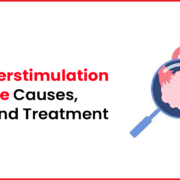IUI Failure: Symptoms, Reasons & Causes
Intrauterine Insemination is a promising procedure to fulfill your dreams of pregnancy. But like any other fertility treatment, IUI also can fail. Let’s try to understand the symptoms, reasons, and causes of IUI failure in the simplest way possible.
What is IUI?
Intrauterine means inside the uterus or the womb. Insemination means injecting seminal fluid or semen which contains sperm cells in the uterus. The semen sample contains sperm cells as well as impurities. So the sample is processed and these impurities are removed. In this way, we are left with good quality, healthy, and motile sperm. Then with the help of a catheter, these sperm cells are injected into the uterine cavity. IUI is a painless procedure and it hardly takes around 5-10 minutes to place the sperm cells in the uterus. The success rates lie between 12 to 15% per cycle.
IUI is the Most Suitable option if
- Both the fallopian tubes are open and are functioning normally.
- Both the quality and the quantity of the eggs in the ovaries are normal. For this, the AMH should be more than 1.5.
- The man has mild oligospermia with good sperm motility.
Also, it is a helpful treatment option in cases of unexplained infertility and for single mothers who wish to have a baby of their own.
What happens when you have unprotected sexual intercourse?
The sperm are ejaculated in the vagina. Then they swim forward to enter the uterus through the cervix also known as the mouth of the uterus. Around 90% of the sperm get destroyed naturally during this phase. The remaining 10%, somewhere around 3 million sperm reach the uterus. For natural pregnancy, it is an important parameter that at least 1.5 to 2 million sperm reach the uterus.
But in some men, the sperm count is around 12 to 15 million per semen sample. So in this situation, only 0.5 to 0.7 million sperm can make their way into the vagina. This makes natural conception a difficult dream. IUI procedure helps couples stuck in this situation.
In IUI the motile sperm cells are directly injected into the uterus. In this way, the distance that the sperm needs to cover to reach the fallopian tube is decreased. This helps increase the chances of conception if all the other parameters related to pregnancy go well.
IUI procedure should only be opted for a maximum of 4 to 6 times. Other infertility treatments are available that can help increase your chances of achieving pregnancy.
Factors Influencing IUI Success Rates
The success rate of IUI is maximum when the following parameters are kept in check:
- The woman should be of fertile age
- Good ovarian reserve
- Healthy and motile sperm
- Proper drug administration when needed
- The root cause of infertility is suitably treated
- Choosing the Right Fertility Clinic
IUI failure symptoms
There are no specific symptoms associated with the failure of the IUI procedure. If pregnancy does not occur, you might witness the following signs:
- Return of Menstrual Cycle-: If you get your monthly cycle after IUI it is a clear indication of failure of this procedure.
- Negative Pregnancy Test-: In case your monthly cycle is delayed but the pregnancy test comes out to be negative then the IUI cycle is unsuccessful.
- Absence of Implantation Bleeding-: If the IUI procedure is successful then after 2 weeks you will have implantation bleeding. You will witness spotting on your underwear. If you don’t it means the IUI cycle failed.
In case you experience severe cramping or have sudden vaginal discharge consult your medical expert without any delay.
IUI failure reasons
Going back to the IUI procedure we learned that the sperm cells are injected into the uterus so they can reach the eggs lying in the fallopian tubes. However, leaving the sperm in the uterus does not ensure pregnancy. The journey of the sperm got shorter but it has so many hurdles to cross.
The rest of the things we allow to happen naturally. There can be many things that can go wrong before, during, or after fertilization. There might be some problem with the sperm, egg, or both.
IUI Failure Causes
As already mentioned the success rate of the IUI procedure is 12 to 18%. This means if 100 couples opted for IUI only 12 or 18 of them will end up conceiving. This is a harsh reality of IUI that we have to accept. Experts say the success rate increases with every IUI cycle.
Following is the list of IUI failure causes:
-
Fallopian Tubes are not Working Properly-:
Open fallopian tubes do not guarantee fertilization as these two tubes have multiple roles to play in pregnancy.This includes collecting the egg from the ovaries, providing ground for the fusion of sperm and egg, and carrying the embryo to the uterus for implantation.
If the fallopian tubes fail to perform any of these functions it can result in IUI failure.
-
Poor Egg Quality-:
Imagine wanting a healthy apple tree with poor quality seeds. In the same way, poor-quality eggs will not lead to a successful conception.
Poor egg quality leads to the formation of weak and abnormal embryos, is associated with chromosomal abnormalities, and will lead to problems in implantation or cause frequent miscarriages. This proves how poor egg quality can result in IUI failure.
-
Defective Sperm-:
IUI procedure revolves around sperm motility. IUI can only provide a ladder to reach the eggs. The sperm cells should be healthy and strong enough to reach the eggs waiting in the fallopian tubes.
Also, the sperm can get destroyed in the uterus due to several reasons. These circumstances will lead to IUI failure.
-
Using Frozen Sperm with Impurities-:
Sometimes when using frozen sperm in IUI there is a slight possibility that some impurities are present that can lead to unsuccessful fertilization.
-
Timing of Ovulation-:
For IUI to be successful the sperm should fertilize the egg within the fertile window. But even after injecting the sperm into the uterus with the help of IUI, it may fail to reach the egg. If this happens the egg will disintegrate and will no longer be available for fertilization if the sperm comes later.
Another scenario can be the sperm reaching the fallopian tubes before ovulation. In this situation, pregnancy will not occur. The timing should be perfect for IUI to be successful.
-
Advanced Age of the Woman:
Age plays a vital role in pregnancy. No matter if you are trying naturally or taking the help of a fertility treatment. IUI fails when the woman is of advanced age.
The best age for a woman to have IUI is below 35 years of age. The success rate is witnessed to be maximum in this age group as her reproductive organs are functioning well.
After 35 years of age IUI success rates further fall to 8 to 10% per cycle.
IUI is not the right option for women over 40. The success rate of IUI for this age group is around 2% per cycle. So if a woman decides to choose IUI after 35 the chances of conception are not promising.
-
Ectopic pregnancy-:
The sperm fertilizes the egg and forms an embryo. Now the embryo will take shelter in the fallopian tube for 5 days. Then the fallopian tubes should transfer the egg to the uterus or womb for implantation.
A healthy pregnancy can occur only when the embryo gets implanted in the uterine cavity.
But if the embryo gets stuck in the fallopian tube it will have no source of oxygen and nutrients to grow into a baby. This condition is called ectopic pregnancy. It can be a reason for IUI failure. Also, it can put the woman’s health at risk if not treated timely.
-
Implantation Failure-:
Endometrial lining decides the success or failure of implantation of the embryo. This lining is responsible for supplying oxygen to the embryo, nourishing it with nutrients, and protecting it from any harm in the womb. The thickness of the endometrial lining should be between 8 to 15 mm.
If this lining is not thick enough implantation is not possible. This will result in IUI failure.
-
Deficiency of Pregnancy Hormones-:
The ovaries are responsible for secreting pregnancy hormones namely estrogen and progesterone to support a healthy pregnancy. Various complications can arise if there is a deficiency of these hormones in the body. This can also lead to the failure of the IUI cycle.
Medical Conditions-:
Polycystic Ovarian Symptoms commonly known as PCOS or PCOD, diabetes, endometriosis, and cervical cancer can reduce IUI success rates.
-
Nature-:
Imagine both the egg and the sperm can be healthy. They fused and formed a healthy embryo but still, IUI failed. This can’t be explained with any scientific evidence. All we can say is that nature did not allow the pregnancy to occur.
So what are the alternatives that can bring positive pregnancy results?
-
IVF-:
In-vitro fertilization can be the right option for you if you are over 35 years of age, have poor ovarian reserve, PCOS, fallopian tube failure, endometriosis, or unexplained infertility.
It offers a success rate of 35-40% for women below 35. For women over 35, the success rate lies between 25-30%.
-
ICSI-:
Intracytoplasmic Sperm Injection can be a suitable treatment for you if the male partner has severe infertility issues. These include low sperm count, poor motility, poor morphology, and PGD.
It offers a success rate of 80 to 85% when performed with zero errors.
The most important step after IUI failure
A good clinic like Imprimis IVF Srinagar ensures the maximum success rate of this ART procedure. Only a good clinic can ensure success with ICSI or IVF. You can look at any success story after multiple failures or ask a medical expert about the importance of the fertility center you choose. It can either turn your dreams into reality or shatter them.
Final Words
Fertility treatments can be mentally, physically, emotionally, and financially draining. Please do not decide on the most suitable infertility treatment option by yourself. Acknowledging the importance of an expert is the right thing to do. If you have had multiple IUI failures do extensive research about the best fertility centers and consult with their expert. Then only take the final decision regarding the treatment.










